Supreme Court nominee Brett Kavanaugh responded to allegations of sexual assault with anger and emotion today, almost shouting his opening statement and stopping repeatedly to fight back tears and compose himself. Kavanaugh said he had no ill will toward Ford, but denied her allegations.
During nearly four hours of prior testimony before the Senate Judiciary Committee, Ford told senators that Kavanaugh attacked her at a gathering while they were in high school. She said the attack is seared in her memory and she is “100 percent” certain that it was Kavanaugh who attacked her.
Sen. Kamala Harris questions Kavanaugh at confirmation hearing

Harris questions Kavanaugh
Senate Republicans blame Feinstein for not bringing Dr. Christine Blasey Ford’s letter to light earlier
Senate Republicans repeatedly blamed ranking Democrat Sen. Dianne Feinstein for not revealing earlier Dr. Christine Blasey Ford’s letter detailing her allegations that Supreme Court nominee Brett Kavanaugh sexually assaulted her in high school.
Finally at the end of the day, Feinstein interrupted Sen. Thom Tillis (R-N.C.) to push back.
“I did not hide Dr. Ford’s allegations. I did not leak her story,” Feinstein said. “l was given some information by a woman who was very much afraid, who asked that it be held confidential, and I held it confidential until she decided that she would come forward.”
Republicans said they could have investigated her claim while protecting her identity, without delaying the confirmation process.
Ford named herself in the Washington Post after news and vague details about the letter leaked to the news media, and thanked Feinstein in her opening statement.
Nearly every Republican on the committee, and Kavanaugh, have directly referenced Feinstein today. Sen. Lindsey Graham (R-S.C.) accused her and Democrats of “lying in wait” to release the letter. Kavanaugh echoed that in his opening statement.
“Some of you were lying in wait and had it ready. This first allegation was held in secret for weeks by a Democratic member of this committee, and by staff. It would be needed only if you couldn’t take me out on the merits.”
Tillis told Democrats that if they were worried about having a full investigation, “I would tell you to pound the table with your ranking member and leadership on your side [asking] why didn’t we … we do our part in the investigation.”
Feinstein had forcefully defended herself in her opening statement.
“Yes, I did receive a letter from Dr. Ford,” Feinstein said. “I held it confidential, up to a point where the witness was willing to come forward.”
Otherwise, Feinstein kept quiet as they criticized her.
Sen. Mazie Hirono (D-Hawaii) said Republicans were accusing Feinstein and Democrats of political posturing because they were trying to change the conversation from Ford’s testimony.
“They want to distract us from what happened here this morning,” Hirono said.
President Trump calls Kavanaugh’s testimony ‘powerful, honest, and riveting’
White House staffers rally behind Sen. Lindsey Graham’s remarks on Democrats and Kavanaugh
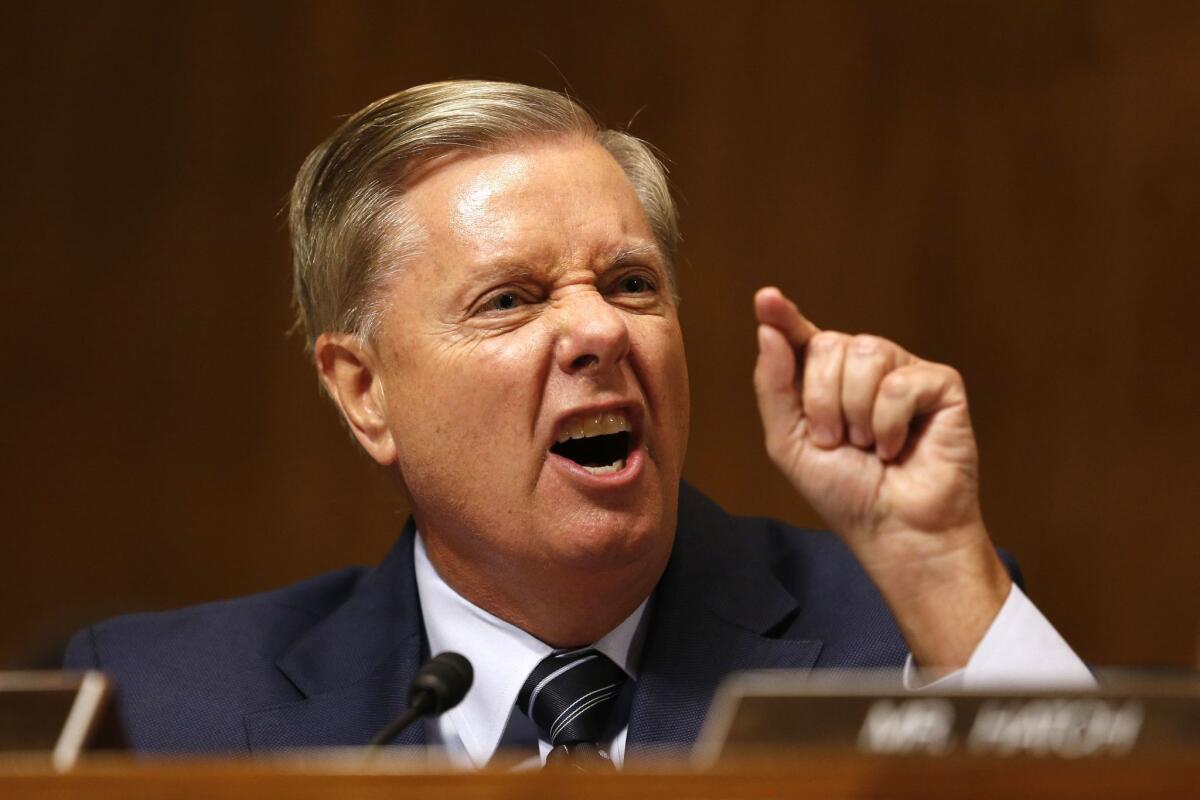
Two White House aides applauded Sen. Lindsey Graham after the South Carolina Republican delivered an angry diatribe against Democrats at the Senate hearing Thursday on one of the sexual assault complaints against Supreme Court nominee Brett Kavanaugh.
“This is the most unethical sham since I’ve been in politics,” Graham angrily and loudly railed, accusing Democratic colleagues on the Senate Judiciary Committee of trying to destroy Kavanaugh’s reputation in an effort to keep him off the nation’s highest court.
An administration official involved in the confirmation process called Graham’s remarks “amazing.” Separately, Marc Short, the former White House liaison to Congress, predicted that Kavanaugh’s own impassioned, irate and often partisan testimony would help him win confirmation along party lines.
Graham was the first Republican lawmaker on the committee who used his allotted five minutes to speak himself rather than ceding the time to Republicans’ hired prosecutor, Rachel Mitchell. He emphatically told Kavanaugh he would be voting to confirm him and challenged his party colleagues to do the same.
The White House took to Twitter to express approval.
Kellyanne Conway, counselor to the president, tweeted Graham’s endorsement and his condemnation of “the outrageous and unfair treatment” of Kavanaugh. And Press Secretary Sarah Huckabee Sanders wrote that Graham “has more decency and courage than every Democrat member of the committee combined. God bless him.”
Watch Sen. Graham angrily defend Kavanaugh at hearing: ‘What you want to do is destroy this guy’s life’

Sen. Lindsey Graham (R-S.C.) said to Democrats on the panel: “What you want to do is destroy this guy’s life, hold this seat open and hope you win in 2020. You’ve said that, not me.”
Republican Sen. Lindsey Graham angrily defended Supreme Court nominee Brett Kavanaugh during his hearing Thursday.
“What you want to do is destroy this guy’s life, hold this seat open and hope you win in 2020. You’ve said that, not me,” Graham, of South Carolina, said to the Democrats on the panel.
Graham was the first GOP senator to speak for himself instead of turn their allotted time over to special counsel Rachel Mitchell.
Graham, addressing his fellow Republicans, said, “If you vote no you’re legitimatizing the most despicable thing I have seen in my time in politics.” Turning to Democrats, he said, “You want this seat? I hope you never get it.”
He told Kavanaugh that when he sees Justices Sonia Sotomayor and Elena Kagan, “tell them that Lindsey said hello. Because I voted for them. I would never do to them what you’ve done to this guy.”
Echoing Graham, Sen. John Cornyn (R-Texas) said the hearings were an embarrassment.
“I can’t think of a more embarrassing scandal for the United States Senate since the McCarthy hearings,” he said.
Sen. Durbin has a suggestion for Kavanaugh: Call for an FBI investigation

Sen. Dick Durbin (D-Ill.) questions Supreme Court nominee Brett M. Kavanaugh.
Sen. Dick Durbin (D-Ill.) in his questioning period quoted Brett M. Kavanaugh’s opening statement when he said he would “welcome any kind of investigation.”
“I’ve got a suggestion for you. Right now, turn to your left in the front row to Don McGahn, counsel to President Donald Trump. Ask him to suspend this hearing and nomination process until the FBI completes its investigation of the charges made by Dr. Ford and others.”
Sen. Lindsey Graham calls Kavanaugh’s confirmation process ‘hell’
President Trump, watching at the White House, is heartened by Kavanaugh’s testimony, aides say
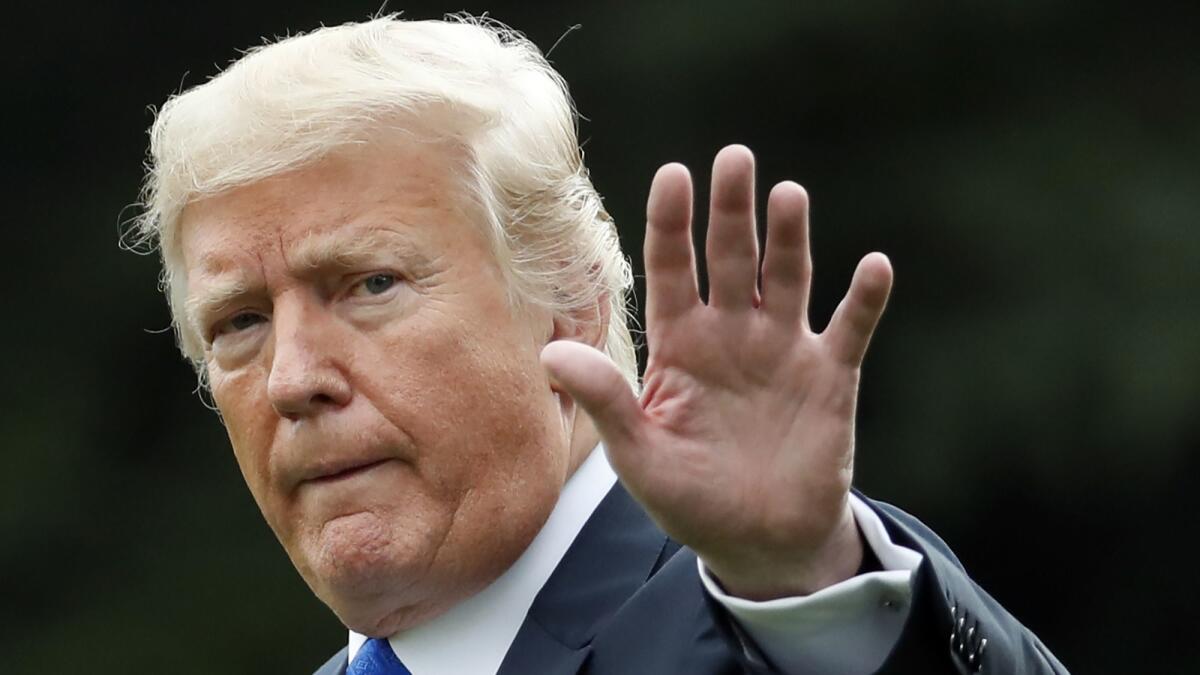
President Trump was glued to the television and heartened by the fiery testimony of his Supreme Court nominee, aides said, as Brett M. Kavanaugh defended himself against allegations of sexual assault on Thursday before the Senate Judiciary Committee.
One senior administration official involved in the confirmation process described Kavanaugh’s performance as “powerful…strong…game changing” in a text message.
The president was “happier” to see Kavanaugh defending himself so vigorously, another administration official said, as Trump had counseled Kavanaugh to do earlier in the week after the nominee and his wife appeared on Fox News.
Even as administration officials and allies sought to circle the wagons around the embattled nominee, the aide said that Trump was “waiting until it’s over” to assess the viability of Kavanaugh’s eventual confirmation.
Many administration officials tweeted support for Kavanaugh, as did the president’s son. “I love Kavanaugh’s tone,” Donald Trump Jr. tweeted. “It’s nice to see a conservative man fight for his honor and his family against a 35 year old claim with ZERO evidence and lots of holes that amounts to nothing more than a political hit job by the Dems.”
Watch Kavanaugh call the confirmation process a ‘national disgrace’ in his opening statement

In his lenghty opening statement, Supreme Court nominee Brett M. Kavanaugh addresses accusations of sexual misconduct.
Hour 1 analysis: Kavanaugh takes a page from Clarence Thomas’ defense strategy
Brett M. Kavanaugh took a page from Clarence Thomas’s defense Thursday, accusing Democratic senators and “the left” of seeking to smear his good name in order to defeat his Supreme Court nomination.
Thomas, defending himself a generation ago against charges of sexual harassment leveled by Anita Hill, denounced the Senate Judiciary Committee hearing into the accusation as a “high-tech lynching for uppity blacks.” He successfully portrayed himself, not Hill, as the victim in the process.
Kavanaugh described the current committee’s hearings as a “national disgrace,” and “grotesque and coordinated character assassination.” In emotional testimony, interrupted several times as he fought back tears, he condemned the process as a “coordinated … political hit.”
Thomas’ charge carried enormous political resonance because of his race. Democratic senators at the time were fearful of showing any disrespect to an African American nominee, however much they opposed Thomas.
Kavanaugh, a white male from a relatively privileged background, may not be able to stir the same level of political fear among his opponents. But by tapping into the sense of grievance that many of President Trump’s supporters feel against the liberal political and cultural elite, he may protect himself against defections on his own side.
Viewers at the White House conclude Ford was a good witness; hearing ‘was a mess,’ aide says
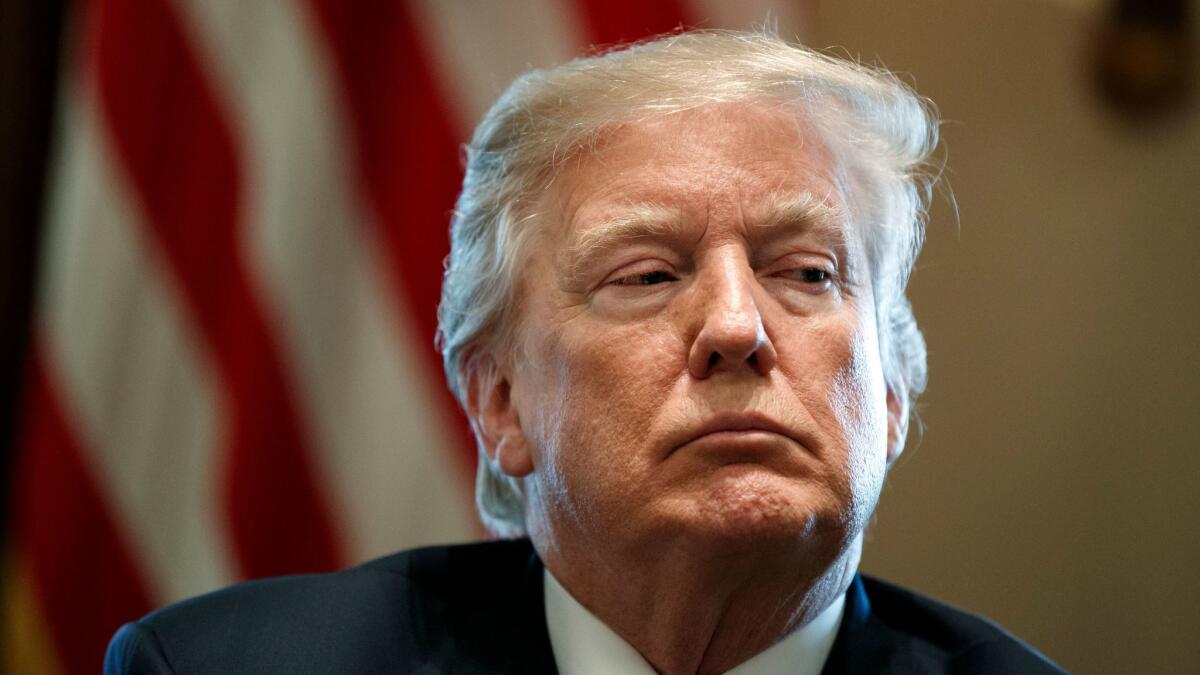
Before Brett M. Kavanaugh followed his accuser Christine Blasey Ford in testifying at the Senate Judiciary Committee, the viewers inside President Trump’s White House concluded that she had proved to be a good witness and that the hearing “was a mess” for the cause of Kavanaugh’s nomination to the Supreme Court, according to one aide there.
“She’s credible,” the aide, insisting on anonymity given the controversy, said of Ford, while the sight of 11 white Republican men on the committee sitting by silently to let a female prosecutor question Ford “was a mess.”
The president, who watched first on Air Force One while returning from New York and then at the White House, had defended Kavanaugh during a news conference on Wednesday but said he could change his mind after the hearing, depending on how Ford and Kavanaugh came off.
On the whole, administration aides and Republicans on Capitol Hill seemed willing to acknowledge Ford’s credibility and that her testimony was moving. But they showed no indication of deviating from a strategy of pointing out that the allegations cannot be “corroborated” and blaming Democrats for sabotaging Kavanaugh. Ford, in her testimony, denied any coordination with Democrats.
Citing the “scant evidence” and the timing of the charges against Kavanaugh, coming after the nominee’s initial confirmation hearing and before a committee vote, a Senate Republican source said most in the party are “closing ranks” behind him.
“We don’t know if we’ll have the votes, but unifying around that is the best chance,” the Senate source said.
Kavanaugh: ‘I did not drink beer to the point of blacking out’
If Christine Blasey Ford’s testimony stirred up painful memories, here’s where you can get help
Millions of people heard Christine Blasey Ford tell the Senate Judiciary Committee about a long-ago gathering where she said Supreme Court nominee Brett M. Kavanaugh pinned her to a bed, pushed his body against hers, tried to remove her clothes and held his hand over her mouth as she tried to scream for help.
The story was difficult to take in, and that’s especially true for victims of sexual assault.
If Ford’s testimony stirred up painful or traumatic memories, there are places you can turn for help, including:
Kavanaugh emphatically denies allegations in opening statement, accuses Democrats of ‘lying in wait’
Embattled Supreme Court nominee Brett M. Kavanaugh emphatically and passionately denied allegations that he sexually assaulted Christine Blasey Ford in the early 1980s.
“I have never done this — to her or anyone,” Kavanaugh said during a lengthy opening statement at which he turned both angry and tearful.
“This has destroyed my family and my good name. A good name built up through decades of very hard work and public service,” he said, calling the allegations brought by Ford and other women a “calculated and orchestrated political hit.”
President Trump’s nominee blasted the Senate and the Judiciary panel for withholding the allegation until his confirmation hearing was complete.
“This confirmation process has become a national disgrace,” he said, noting the Senate’s role in the confirmation process. “But you have replaced advise and consent with search and destroy.”
He criticized Democrats for their questioning at the first four days of his confirmation hearing. But, it was “just a good old-fashioned attempt at Borking,” he said. When that failed, Kavanaugh said Democrats needed new tactics and “some of you were lying in wait and had it ready.”
Kavanaugh said he has no ill will toward Ford, choking up before the committee when he described his daughters saying prayers for Ford.
“Liza, all of 10 years old, said to Ashley, ‘We should pray for the woman,’” Kavanaugh said. “That’s a lot of wisdom from a 10-year-old.”
Kavanaugh says confirmation process ‘has become a national disgrace’
Ford explains why other people don’t remember assault: ‘Nothing remarkable happened to them that evening’

Christine Blasey Ford on why the other witnesses don’t remember the party where the alleged assault took place: “Nothing remarkable happened to them that night.”
Ford says Mark Judge’s resume could help clear up fuzzy timeline of alleged assault
Christine Blasey Ford wants to know when Mark Judge worked at the Potomac, Md., Safeway store.
During Thursday’s hearing before the Senate Judiciary Committee, Ford said she could better nail down the date of her alleged assault by Supreme Court nominee Brett Kavanaugh if she knew when Judge, a friend of Kavanaugh’s who Ford said participated in the attack, worked at the grocery store.
Ford said she ran into Judge at the store six to eight weeks after the assault during a summer in the early 1980s. Ford believes it was 1982, but is unsure.
“It would be helpful … to figure out when he worked there, if people are wanting more details from me about when the attack occurred,” Ford said. “If we could find out when he worked there, then I could provide a more detailed timeline as to when the attack occurred.”
Ford said Judge was working at the store when she saw him.
“I said hello to him and his face was white and very uncomfortable saying hello back,” Ford said. “He was nervous and not really wanting to speak with me.”
GOP’s decision to bring in outside counsel wins praise — from Democrats
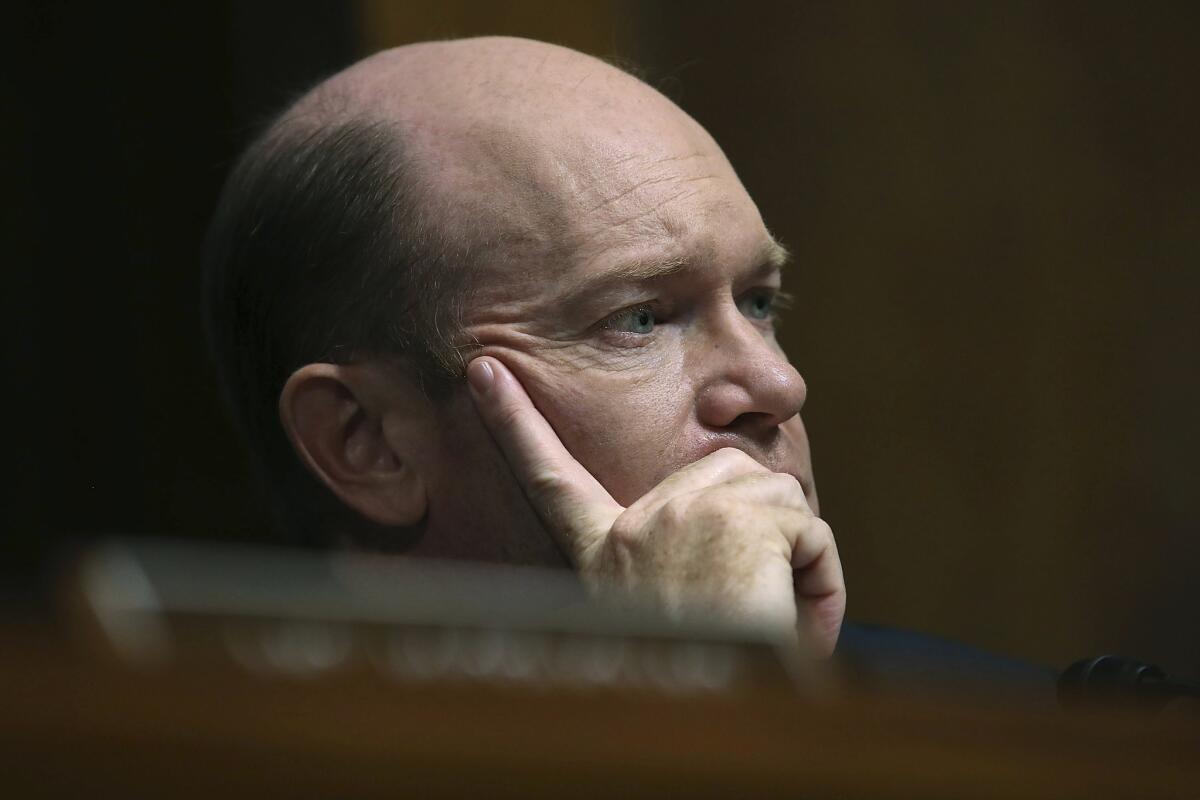
GOP senators’ strategy of bringing in an outside counsel to do their questioning may have saved Republicans from embarrassing flubs, but two hours into the hearing, she doesn’t appear to have successfully undermined Christine Blasey Ford’s story, observers say.
“The Republicans’ choice to hire an outside prosecutor, which frankly initially filled me with dread because I thought we’d see a harsh prosecutorial style today, has worked out better than I had expected,” said Sen. Chris Coons (D-Del.). “Her questioning has been professional and level. It does lead to the odd visual of a whole group of senators sitting in silence with someone they hired to question for them is questioning.”
Conservative TV commentators have been frustrated that special counsel Rachel Mitchell hasn’t been able to discredit Ford’s claim that she was assaulted by Supreme Court nominee Brett M. Kavanaugh when they were both in high school. Democrats say Mitchell was undercut by there not having been an FBI investigation of the allegation, which Republicans have resisted.
“There is an old saying; as a former prosecutor I learned it well: Don’t ask the question if you don’t know the answer. And she has no idea what the answer is going to be,” Sen. Richard Blumenthal (D-Conn.) said of Mitchell. “At least tactically speaking, her own interest would have been better served by having an investigation.”
Watch Hawaii Sen. Mazie Hirono’s full statement at the Kavanaugh-Ford hearing

Watch Hawaii Sen. Mazie Hirono’s full statement at the Kavanaugh-Ford hearing.
TV analysis: How cable news has reacted to the Kavanaugh-Ford hearing
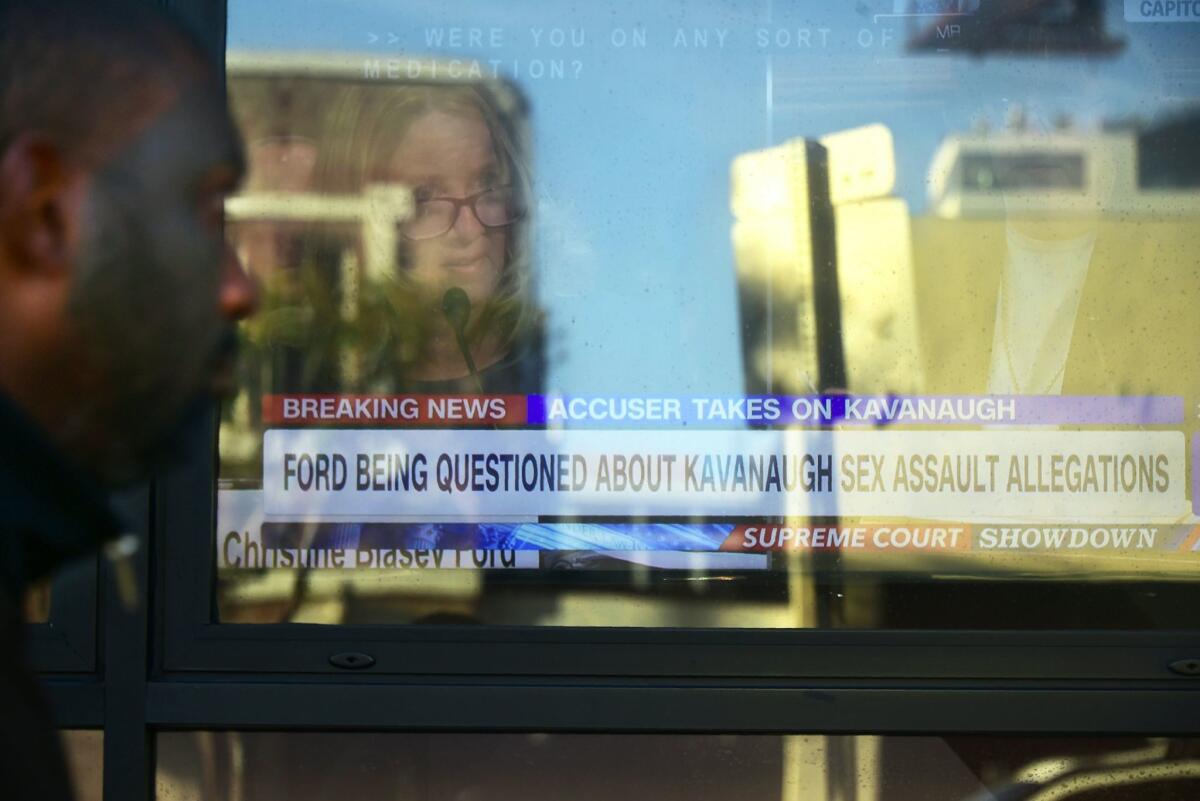
During a lunch recess in the Brett Kavanaugh-Christine Blasey Ford hearing, CNN legal analyst Jeffrey Toobin appeared flummoxed by the tactics of outside counsel Rachel Mitchell as she questioned Ford. Mitchell, a sex-crimes prosecutor from Maricopa County, Ariz., is serving as a proxy for male Republican senators who declined to question Ford directly about her allegations that Kavanaugh and his friend Mark Judge sexually assaulted her in 1982.
“I can’t figure out what she’s getting at,” said Toobin. “It’s CSI, Chevy Chase.”
He was referring to Mitchell’s tactics in the second and third hour of the hearing, when she asked Ford about her admitted fear of flying, and then brought up several incidents in which she took airline trips.
In between each Democratic senator’s five-minute time block, during which they asked how confident she was that her attacker was Kavanaugh (“100%,” she said), and commending her bravery, and combating the politics of the other side, Mitchell kept returning to the subject of airplanes. Ford flew for her grandmother’s funeral, a polygraph test and for the hearing, Mitchell pointed out.
Meanwhile on Fox News, a panel didn’t spend as much time dissecting Mitchell’s strategy. After conceding Ford was credibly emotional, they focused mostly on Kavanaugh and how he needed to come off as credible as Clarence Thomas. “Really, [Kavanaugh’s] guilty until proven innocent by himself,” said Bret Baier.
As the recess ended, political pundits and reporters across the three main cable news outlets wrapped up their narratives about where the hearing was headed.
Fox’s Brit Hume assured viewers who were pulling for Kavanaugh that there were no damaging “sound bites” so far. If there was anything to come, it’ll be from her testimony, he said, not the Democrats.
Watch Sen. Blumenthal praise Ford: ‘You have inspired and you have enlightened America’

Sen. Richard Blumenthal (D-Conn.) praised Christine Blasey Ford on Thursday, telling her that she had enlightened both men and women by her testimony. Ford alleges Supreme Court nominee Brett Kavanaugh assaulted her decades ago when they were in hig
Sen. Orrin Hatch calls Ford an ‘attractive, good witness’
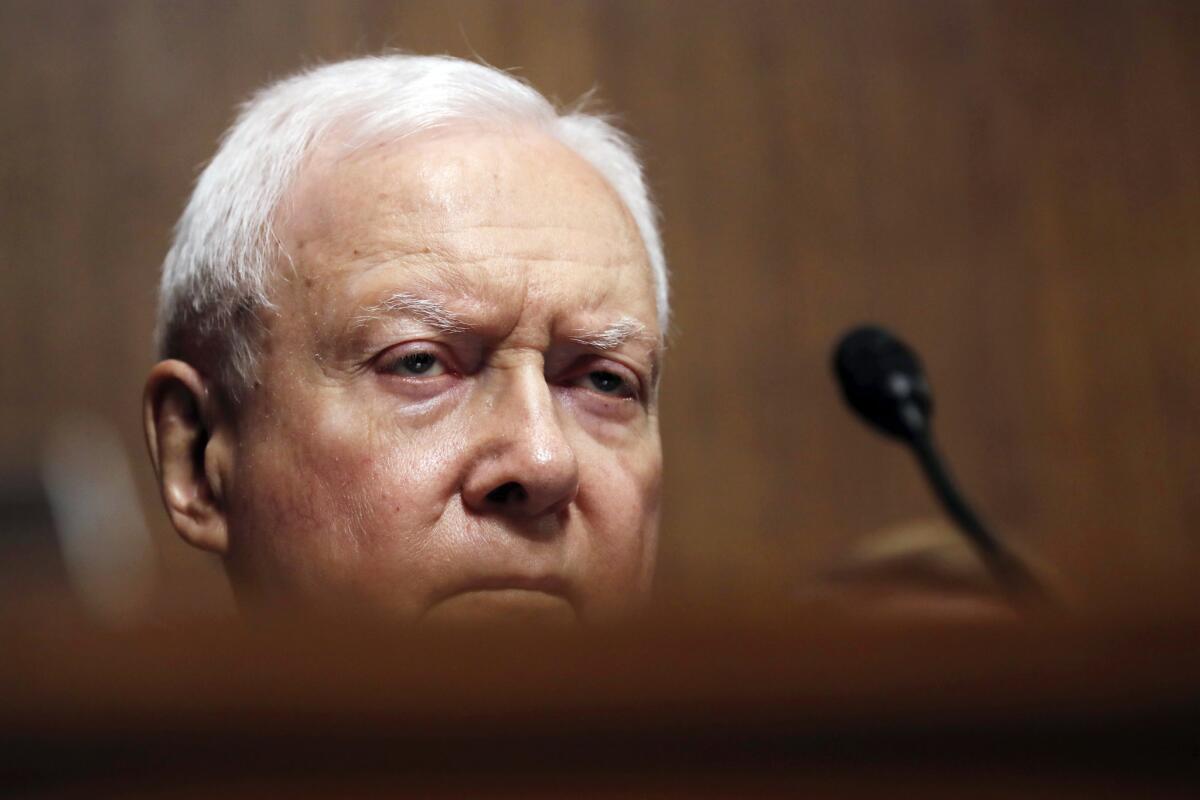
Asked as he left for the lunch break if he has found professor Christine Blasey Ford to be credible, Sen. Orrin G. Hatch (R-Utah) said: “It’s too early to say. I don’t think she’s uncredible, I think she’s an attractive, good witness.”
Asked to clarify what he meant by attractive, Hatch said “in other words, she is pleasing.”
“I can tell you this, she’s attractive and she’s a nice person,” Hatch said. “And I wish her well.”
Hatch has been a strong defender of Kavanaugh and has scowled off and on as the hearing has gone on.
Hatch said he’s not going to second-guess having prosecutor Rachel Mitchell do the questioning for Republicans.
“I think it’s a good format. We’re in the early throes of this and it’s pretty hard to make any kind of determination at this point,” Hatch said.
Hatch said he hasn’t learned anything new during the hearing so far. “I think it’s all preliminary, I don’t think it’s gone very far so far. You have to get the preliminaries out of the way and it’s taken a little bit of time to do that,” Hatch said.
Hour 2 analysis: Prosecutor’s questioning has so far done little to undermine Ford
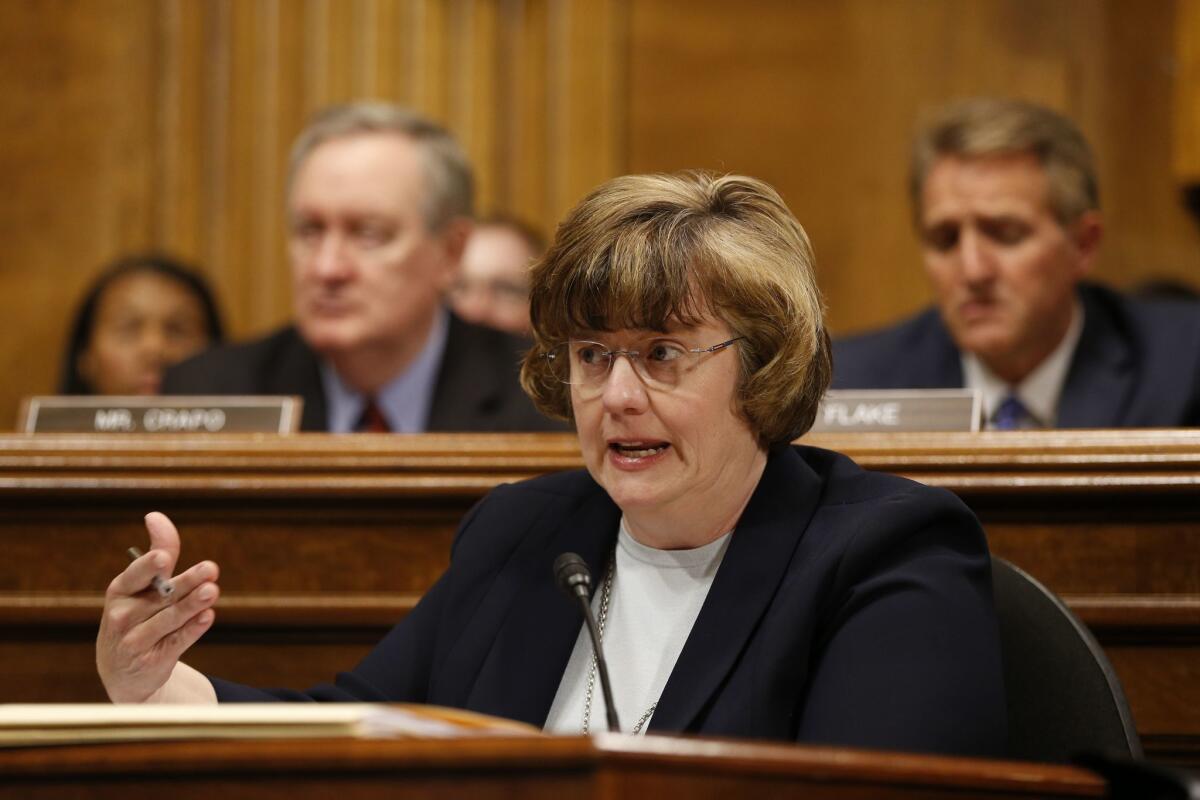
Christine Blasey Ford came across in her hearing Thursday as nervous and unfamiliar with congressional hearings, but fully confident that Supreme Court nominee Brett Kavanaugh assaulted her at a party in the early 1980s.
Her obvious lack of familiarity with the ways of Washington could boost her credibility with undecided lawmakers and the public. It undermined the suggestion by Kavanaugh’s supporters that she’s part of an organized political effort to attack the nominee.
At several points during Thursday’s testimony, Ford relied on instruction from her lawyers. And when Judiciary Committee Chairman Charles E. Grassley (R-Iowa) asked if she needed a break, Ford deferred to the committee.
“I am used to being collegial,” she said.
Ford also appeared emotional at several points while she recounted her testimony and when Sen. Richard Blumenthal (D-Conn.) thanked her for providing a “teaching moment” to the country.
Today’s hearing is far from typical. Ford’s testimony went largely uninterrupted by political snipes or other outbursts like the ones that took place during the first four days of Kavanaugh’s confirmation hearing earlier this month.
In the committee room, senators have watched intently, the only noise has come from the faint sound of reporters typing away on keyboards as Ford and the questioners speak.
Sen. Jeff Flake (R-Ariz.), who has said he’s undecided on voting for Kavanaugh, has had a hand over his mouth almost the entire hearing.
Sen. John Kennedy (R-La.), an attorney and former law school professor, is taking periodic notes. Sen. Orrin G. Hatch (R-Utah), the committee’s former chair and a strong defender of Kavanaugh, has had a scowl on his face as Rachel Mitchell, the committee’s outside counsel, has asked Ford a series of questions to establish basic facts about her recollections.
Mitchell’s questioning has so far done little, if anything, to undermine Ford’s testimony. And the constant shifting back and forth between her calm tone and the more emotional statements by committee Democrats, who have repeatedly complimented Ford, has seemed jarring both inside the room and on television.
Rod Rosenstein was at the White House today — but not to meet with President Trump
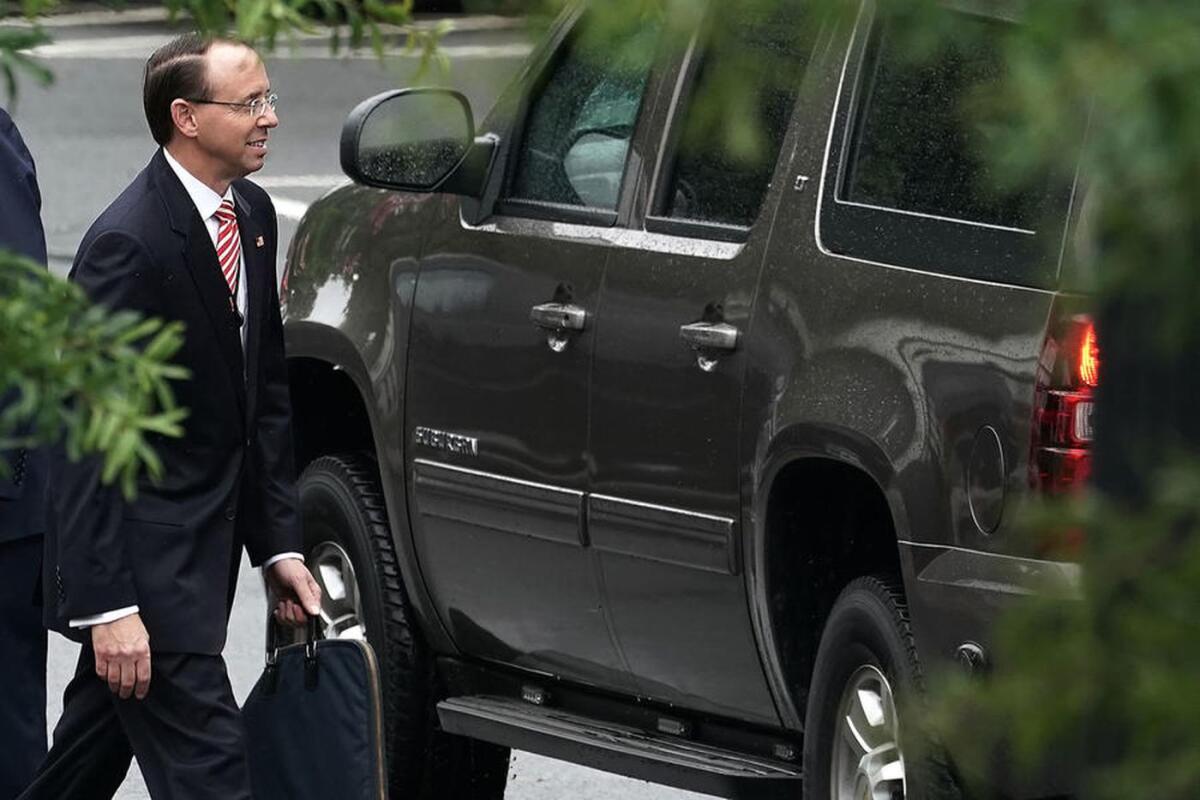
Deputy Atty. Gen. Rod Rosenstein was supposed to meet with President Trump on Thursday amid questions about how long he would remain as the Justice Department’s second in command.
But that encounter has been postponed as all eyes focused on a Senate hearing room, where Christine Blasey Ford has given emotional testimony about an alleged sexual assault by Brett Kavanaugh, Trump’s nominee for the Supreme Court, when they were both teenagers.
Trump himself said he wanted to watch the hearing, and suggested on Wednesday that his meeting with Rosenstein would be delayed. The White House made that official on Thursday afternoon.
“The President spoke with Rod Rosenstein a few minutes ago and they plan to meet next week,” said Sarah Huckabee Sanders, the press secretary. “They do not want to do anything to interfere with the hearing.”
But Rosenstein went to the White House for other meetings Thursday. He left shortly before Trump landed at Joint Base Andrews, outside Washington, returning from the four days in New York for the United Nations General Assembly.
TV analysis: Sen. Grassley and his all-male Republican colleagues attempt to avoid ugliness of the Anita Hill hearing
Much has been made of the optics leading up to the Brett . Kavanaugh-Christine Blasey Ford hearing before the Senate Judiciary Committee on Thursday, in particular about whether the visual of an all-male lineup of Republican senators questioning a lone female accuser on national television might echo the ugliness of the 1991 Clarence Thomas-Anita Hill hearing.
A replay of the Hill grilling wouldn’t just look bad for Republicans, but in the #MeToo era, it could also be disastrous coming a month before the midterms. Their solution was to bring in a woman, outside counsel Rachel Mitchell, to ask the tough questions of Ford, who claimed Kavanaugh and his friend Mark Judge sexually assaulted her in 1982 when she was 15 at a high school house party.
But before Mitchell was introduced, Sen. Charles E. Grassley (R-Iowa) set a defensive tone in his opening remarks, despite a few conciliatory words at the onset of the hearing’s first hour. “I hope my colleagues will join me in a show of civility” he said. But he spent the next 10 minutes or so asking why it took so long for Ford’s claims to be brought forward and how badly the Democrats handled the allegations and calling her initial outreach “secret” rather than confidential.
Grassley then interrupted Sen. Diane Feinstein (D-Calif.) within seconds of her taking the microphone and stopped a visibly nervous Ford within seconds of her first words to ask her to pull her mic closer. He later commended Ford’s bravery, mentioned how unfairly Hill was treated and referenced the #MeToo movement. It was a careful dance between appearing sensitive and needing to get the job done, while hard questions were left up to their female hired hand.
“I exited the bathroom, ran outside the house, and went home,” said Ford, recalling the alleged sexual assault. Her voice was shaky as she described being pushed into a bedroom, pinned down on a bed by Kavanaugh and groped, her mouth covered by his hand. The “boys” (Kavanaugh and his alleged accomplice Judge) were laughing, “having fun at my expense,” she said.
Mitchell didn’t spend much time on the alleged attack, but did immediately question why Ford didn’t remember how she got home that night. Meanwhile, Grassley and his peers remained silent. This time around, they would avoid the optics of discrediting another woman who came forward against their chosen SCOTUS nominee.
Sen. Blumenthal: Ford has ‘given America an amazing teaching moment’
Trump watches Ford’s testimony from Air Force One
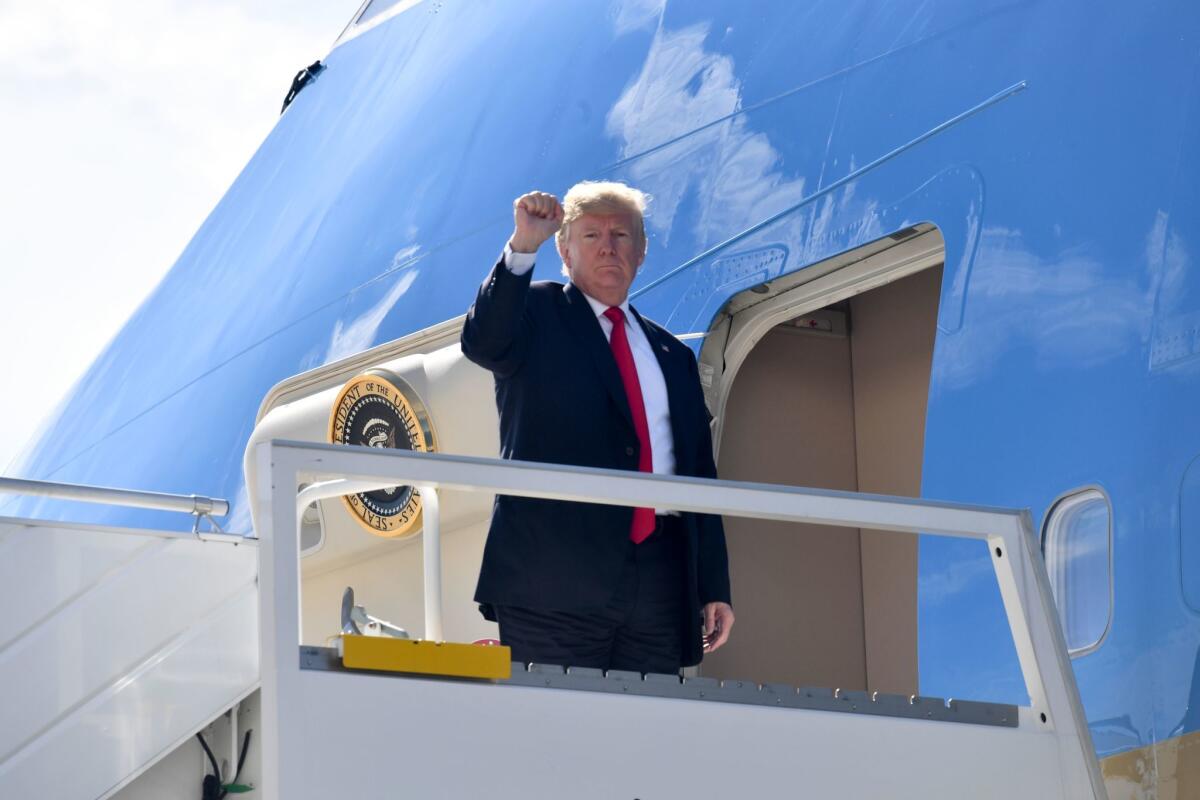
President Trump flew back to Washington as Christine Blasey Ford was delivering dramatic testimony to the Senate Judiciary Committee on Thursday morning, and watched from the executive cabin aboard Air Force One, according to Press Secretary Sarah Huckabee Sanders, who traveled with him.
Trump said Wednesday, at a freewheeling news conference after three days at the United Nations General Assembly in New York, that he sympathized with his Supreme Court nominee, Brett Kavanaugh, after having himself faced what he described as “false accusations.” But he also left the door open to being convinced by Ford’s testimony.
“I can always be convinced,” he said. “I have to hear it.”
The president did not speak with reporters when he arrived back at the White House around noon local time.
Hour 1 analysis: How Christine Blasey Ford’s testimony compares to Anita Hill’s in 1991
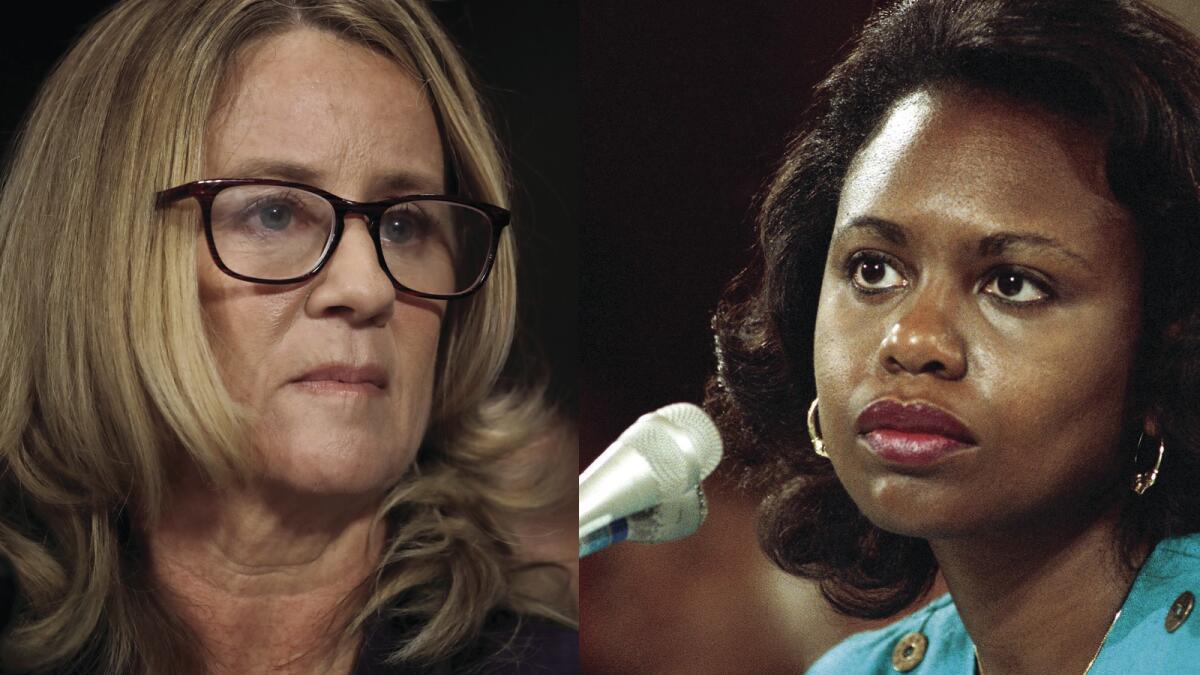
Christine Blasey Ford’s testimony today to the Senate Judiciary Committee has prompted many comparisons to Anita Hill’s a generation ago: So far, through the initial rounds of questions, the differences outweigh the similarities.
Hill faced relentless pounding from Republican senators. One, the late Sen. Arlen Specter of Pennsylvania, accused her of committing “flat-out perjury” in her claim that Supreme Court nominee Clarence Thomas had sexually harassed her at work.
Ford, by contrast, has had no questions from Republican senators. Instead, the committee’s Republican majority has turned its time over to Rachel Mitchell, an outside counsel from Arizona who has extensive experience prosecuting crimes involving sexual violence.
Mitchell’s questioning has been divided into five-minute chunks, alternating with Democratic senators. That has had the effect of stifling the prosecutor’s ability to consistently pursue a line of questioning. Mitchell has asked questions that appear designed to highlight some inconsistencies in Ford’s accounts of what happened to her. But those have so far been minor.
At the same time, Ford has appeared more visibly traumatized by the experience than Hill, who maintained a steely demeanor during her testimony and the subsequent questions.
Democratic senators have used much of their time to repeatedly thank Ford for her testimony. Sens. Patrick Leahy of Vermont and Dick Durbin of Illinois have both praised her “courage.”
In emotional opening statement, Christine Blasey Ford describes alleged sexual assault by Supreme Court nominee Brett Kavanaugh

Christine Blasey Ford, who has accused Supreme Court nominee Brett M. Kavanaugh of sexually assaulting her in high school, testified before the Senate Judiciary Committee on Thursday.
Ford’s strongest memory of alleged assault: ‘the laughter ... their having fun at my expense’
“What is the strongest memory?” of the alleged attack, Sen. Patrick Leahy (D-Vt.) asked Christine Blasey Ford.
“Indelible,” Ford responded “is the laughter, the uproarious laughter between the two, and their having fun at my expense.”
What does ‘sequelae’ mean? Ford displays her professional knowledge of psychology
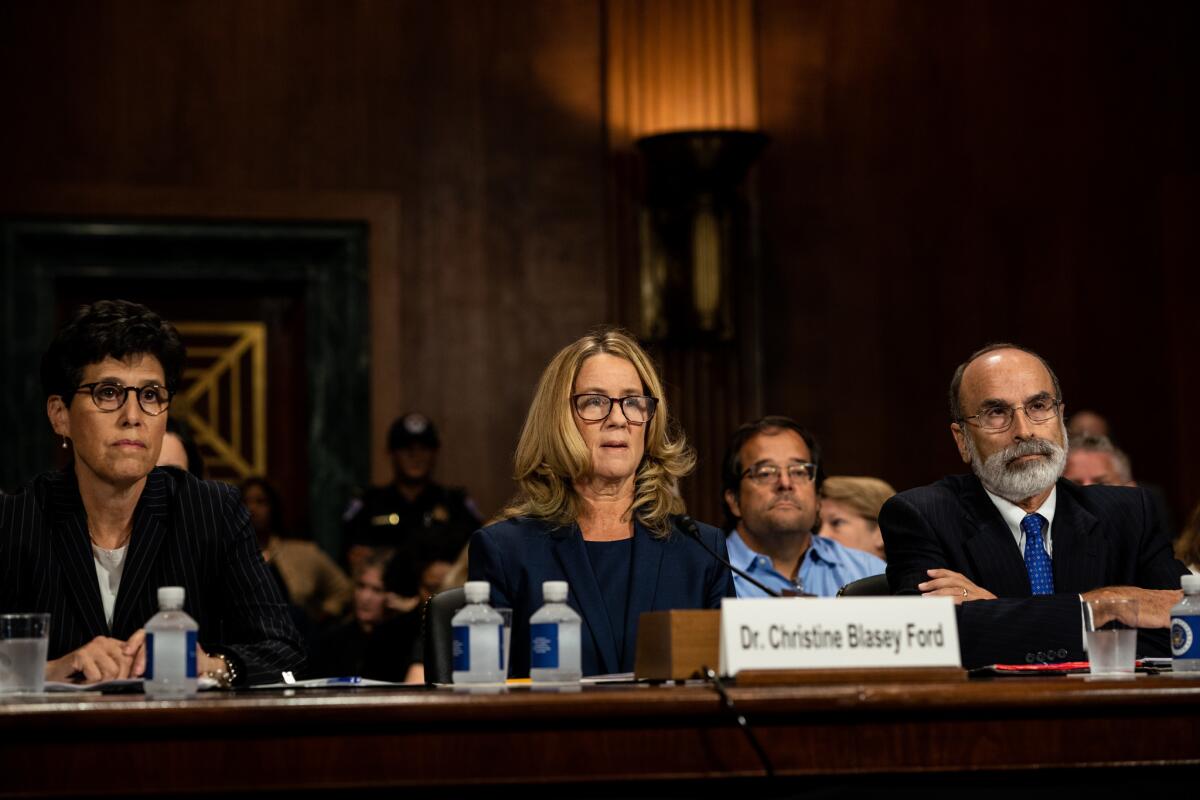
As Christine Blasey Ford has testified, her training as a research psychologist has periodically become obvious.
Asked by Sen. Dianne Feinstein (D-Calif.) about the impact that the alleged attack had on her life, Ford referred to the “sequelae” of the attack, a psychology term that refers to the symptoms that can follow a traumatic event. Ford has a doctorate in educational psychology from USC.
The sequelae of sexual assault vary from victim to victim, she noted, adding that in her case, she had suffered from “PTSD-like” symptoms, including claustrophobia.
Later, Feinstein asked how she could be sure that it was Brett Kavanaugh who had put his hand over her mouth to prevent her from screaming.
“The same way that I’m sure that I’m talking to you right now,” she responded. “Basic memory function.”
Ford went on to refer to the way neurotransmitters in the brain record memories in the hippocampus, a portion of the brain that plays a central role in human memory.
But her responses were not entirely clinical. Asked by Feinstein if there was a possibility that this could be a case of “mistaken identity,” Ford’s response was simple.
“Absolutely not.”
Ford: ‘My responsibility is to tell you the truth’
Ford speaks emotionally about alleged assault
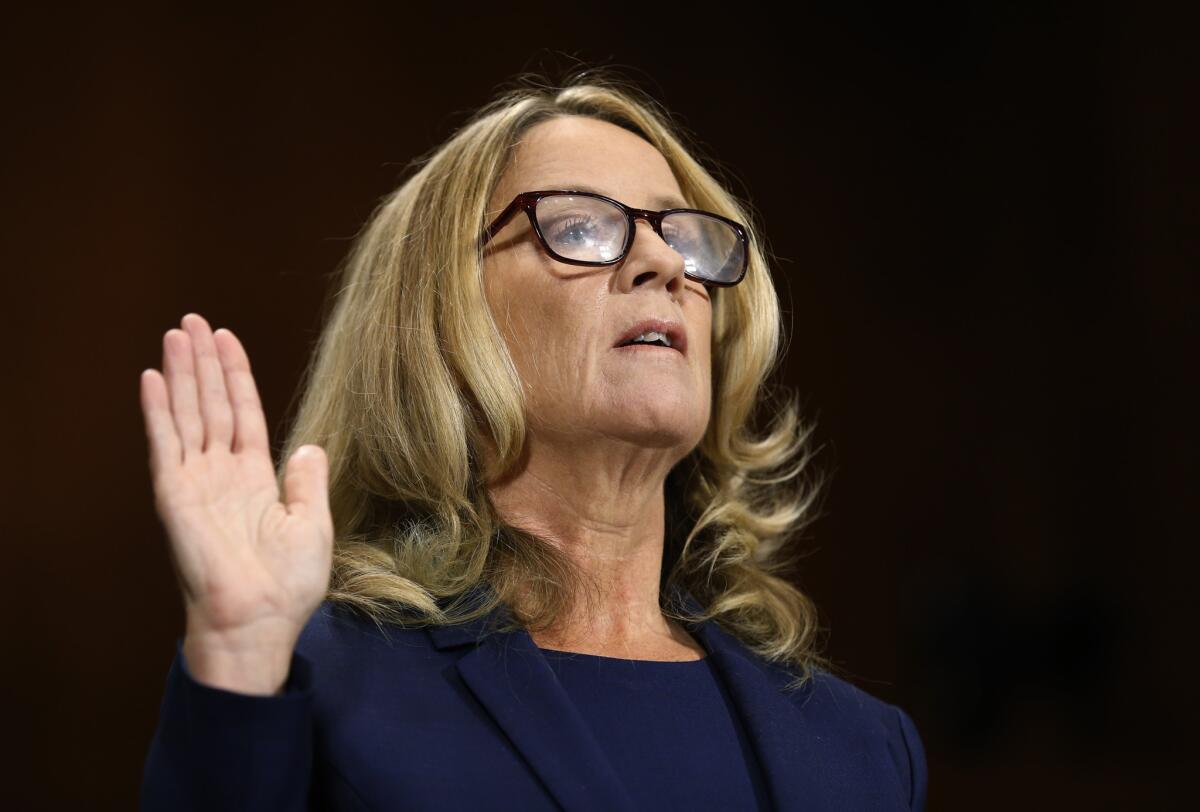
Christine Blasey Ford spoke emotionally as she told the Senate Judiciary Committee about the night she said Brett M. Kavanaugh assaulted her in a bedroom during a house party while they were both in high school.
“I believed he was going to rape me. I tried to yell for help,” Ford said, her voice breaking. “When I did, Brett put his hand over my mouth to stop me from screaming. This was what terrified me the most, and has had the most lasting impact on my life. It was hard for me to breathe, and I thought that Brett was accidentally going to kill me.”
Sen. Feinstein pushes back against Republican criticism over timing of letter release

Sen. Dianne Feinstein defended her decision not to immediately hand over Christine Blasey Ford’s original letter to the Judiciary Committee.
In her opening statement Thursday, Sen. Dianne Feinstein gave a forceful defense of her decision not to immediately hand over Christine Blasey Ford’s original letter to the Judiciary Committee.
“Yes, I did receive a letter from Dr. Ford,” Feinstein, the California Democrat, said. “I held it confidential, up to a point where the witness was willing to come forward.”
Republicans, including Judiciary Committee Chairman Charles E. Grassley (R-Iowa), have begun calling the letter Feinstein’s “secret evidence” saying she released the letter alleging sexual assault by Supreme Court nominee Brett M. Kavanaugh in high school at the most politically opportune time.
“Dr. Ford first raised her allegations in a secret letter to the ranking member [Feinstein] nearly two months ago in July. The ranking member took no action. The letter wasn’t shared with me, our colleagues, or my staff. These allegations could’ve been investigated in a way that maintained the confidentiality Dr. Ford requested,” Grassley said in his opening remarks.
Ford has thanked Feinstein for not disclosing the letter until she was ready, including in her opening remarks.
“I greatly appreciated this commitment. All sexual assault victims should be able to decide for themselves whether their private experience is made public,” Ford said.
Feinstein said the hearing is a sign that political institutions have not kept up with the changing attitudes toward sex and consent.
“How women are treated in the United States with this kind of concern is wanting a lot of reform,’’ Feinstein said.
Hearing opens with an apology to Ford, Kavanaugh
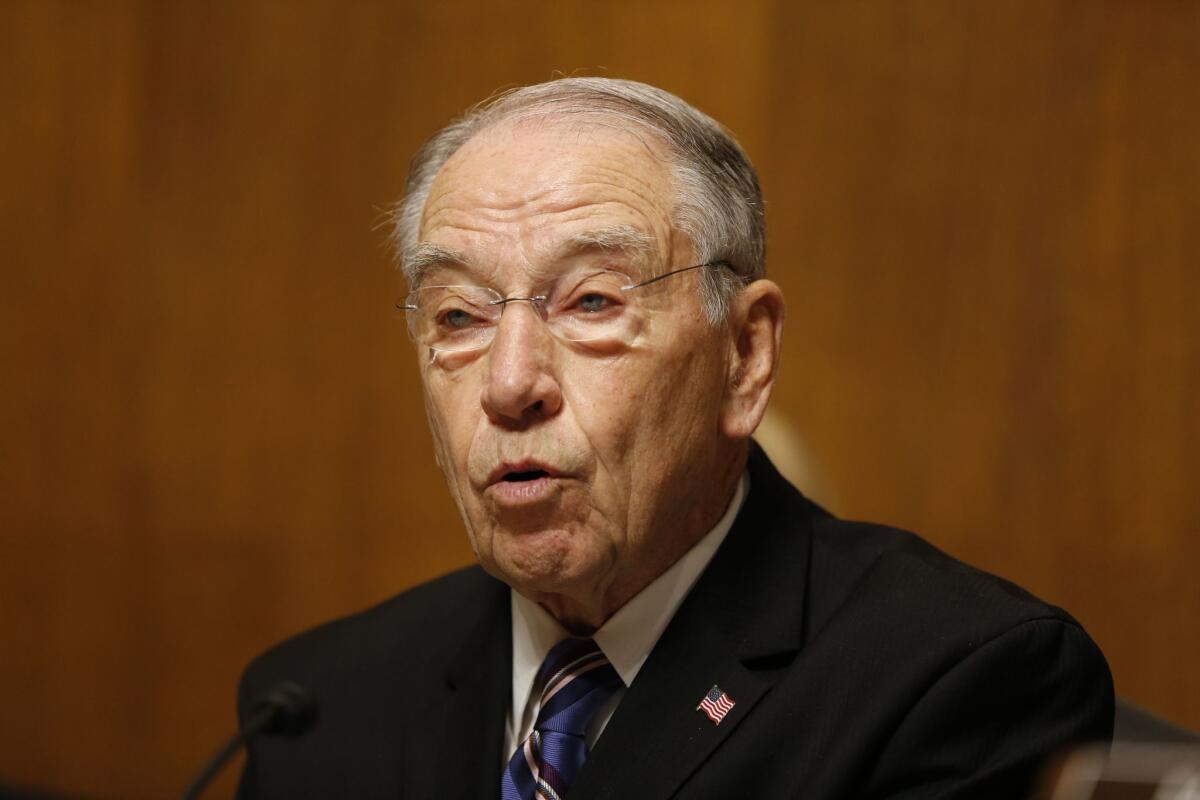
Judiciary Committee Chairman Charles E. Grassley is opening a hearing on sexual assault allegations against Supreme Court nominee Brett Kavanaugh with an apology to both Kavanaugh and his accuser for the way they’ve been treated, saying they and their families have received “vile threats.”
The Iowa Republican promised a “safe, comfortable and dignified” atmosphere Thursday as his committee hears from both.
Grassley also said it had been a “terrible couple of weeks” for both Kavanaugh and his accuser Christine Blasey Ford, the California psychology professor who says Kavanaugh attempted to rape her when they were teens.
Actress Alyssa Milano attends as a guest of Sen. Feinstein
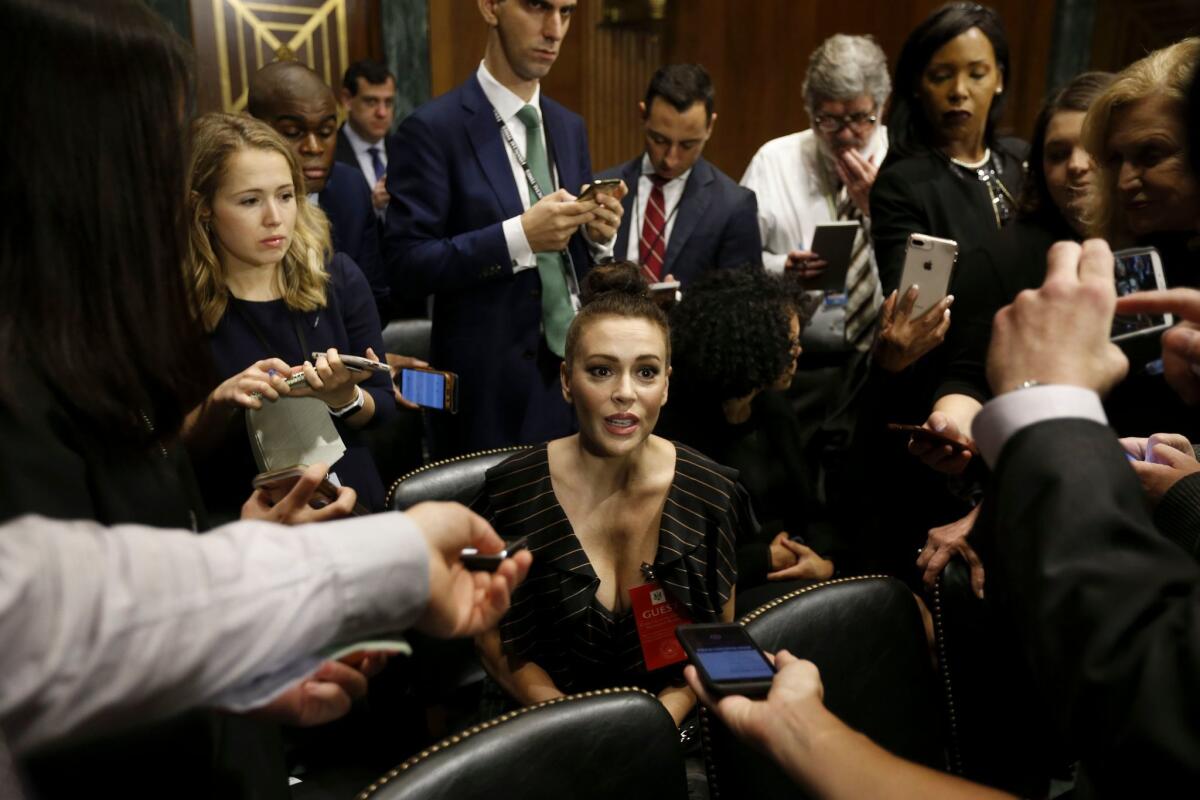
Actress Alyssa Milano, who waited for nearly an hour in the nearly empty committee room for the proceedings to start, is attending as a guest of Sen. Dianne Feinstein (D-Calif.). Milano has been an outspoken activist in the #MeToo era, including protesting on Capitol Hill in recent days, and said she wanted to be in the room as moral support for Christine Blasey Ford.
“Any time people are talking about issues of sexual harassment, assault and abuse it helps,” Milano said. “Progress often lives in the grey areas and I do think that this is helpful.”
She said the 1991 hearings in which now-Justice Clarence Thomas was accused of sexual harassment by professor Anita Hill were “the foundation of my learning about what sexual harassment was.” This hearing will be different, she predicted.
“I think we’re in a different time. I think women are standing together in solidarity, more so than we were in ’91 and I think women throughout the country are not going to let it be what it was,” she said.
Kavanaugh accuser Julie Swetnick gives TV interview
Julie Swetnick, who was the third woman to accuse Supreme Court nominee Brett Kavanaugh of sexual misconduct, spoke with John Heilemann of “The Circus” in her first on-camera interview since coming forward Wednesday.
Watch live: Brett Kavanaugh and Christine Blasey Ford hearing
Here’s what sexual assault experts say you should keep in mind as Christine Blasey Ford shares her story
The Senate Judiciary Committee hearing on Thursday featuring Supreme Court nominee Brett Kavanaugh and his accuser Christine Ford Blasey is likely to be a collision of sexual politics and old-fashioned power politics.
There’ll be a lot of heat, but not necessarily much light.
Still, the situation is not as murky as it might seem. There is a cadre of researchers who study sexual assault and its aftermath. Here’s what they’d like you to keep in mind as you watch Thursday’s proceedings.
Kavanaugh vs. Kavanaugh: Supreme Court nominee has offered conflicting accounts of his teenage drinking
The toughest challenge facing Judge Brett Kavanaugh when he appears at a Senate hearing Thursday about allegations of a decades-old sexual assault may be reconciling the two starkly different depictions circulating about his high school and college years.
Unfortunately for Kavanaugh, both versions — one of a hard-partying, heavy-drinking frat boy and the other of a church-going athlete known from age 14 for respecting women’s dignity — come from Kavanaugh’s own words.
Christine Blasey Ford, a California psychology professor, is expected to tell the committee about what she says was a traumatic encounter in which a 17-year-old, “stumbling drunk” Kavanaugh pinned her to a bed, groped her and put his hand over her mouth to stifle her screams. She says she escaped when Kavanaugh’s friend, Mark Judge, jumped on top of them and they all tumbled to the floor.
Republicans to tread carefully in questioning Kavanaugh and Ford
Republicans head into Thursday’s hearing with Supreme Court nominee Brett Kavanaugh and California professor Christine Blasey Ford with hopes of shoring up his confirmation for a quick Senate vote.
But just as important, they’ll be trying to avoid political embarrassment for themselves.
It will be perhaps the most dramatic congressional standoff since the 1991 Clarence Thomas-Anita Hill hearing, and Republicans are eager to avoid the public backlash that followed that proceeding. A podium of older, white, male senators grilled a young black woman for hours about embarrassing personal and sexual details, and then many dismissed her story as a lie.
Third accuser Julie Swetnick alleges Kavanaugh attended 1982 party where she was gang raped
Supreme Court nominee Brett M. Kavanaugh was present at a 1982 house party where a Washington woman says she was gang raped, according to an explosive statement that her lawyer released Wednesday.
The woman, Julie Swetnick, 55, did not accuse Kavanaugh of participating in the assault, which would have occurred at one of many parties that she said they both attended when Kavanaugh was in high school.
But she said she witnessed efforts by Kavanaugh, his friend Mark Judge and others to get girls “inebriated and disoriented so they could then be ‘gang raped’ in a side room or bedroom by a ‘train’ of numerous boys.
Things to watch for when Kavanaugh and Ford testify
The hearing starts at 7 a.m. Pacific time, and all signs point to it moving forward. But both sides are nervous, so there is always the chance of a last-minute complication.
Christine Blasey Ford, the California professor accusing Supreme Court nominee Brett Kavanaugh of sexually assaulting her when both were in high school, was initially reluctant to come forward and only agreed to appear under certain conditions. Late Wednesday her team submitted her testimony for the record and said she was ready for the hearing.
Kavanaugh has said he is eager to defend himself. Even so, some Republicans have worried privately that he could not survive the spectacle of a public hearing.
Brett Kavanaugh and Rod Rosenstein both learned to ‘tune out the noise’ while investigating President Clinton. Now they’re at the center of it
Ken Starr had firm criteria when hiring lawyers for his independent counsel investigation of President Clinton: The attorneys had to be smart, possess sterling credentials and be willing to log long hours.
Another important skill, he said in a recent interview, was harder to assess, but revealed itself as pressure mounted — an ability to tune out the noise.
Few federal inquiries have generated as much controversy and press attention as the one Starr ran, which ultimately led to Clinton’s impeachment on charges of lying about his affair with Monica Lewinsky.
Who is Rachel Mitchell, the Arizona prosecutor chosen to question Kavanaugh and his accuser?
On Oct. 25, 2005, the Rev. Paul LeBrun appeared in court in Maricopa County, Arizona. The former Catholic priest had been accused of molesting six boys between the ages of 11 and 13 during the late 1980s and early 1990s, after he was transferred to Arizona from a parish in Indiana. But he insisted that he was innocent.
Calling his client the victim of a “witch hunt,” LeBrun’s attorney, Kenneth Huls, did his best to discredit the accusations, the Arizona Republic reported. First, he pointed out that the allegations were more than a decade old. He also noted that three of the victims had felony convictions, while two others were seeking millions from civil lawsuits. The case, he said, was all about false accusations and greed.
For prosecutors, the stakes were high. Two years earlier, an investigation by the Maricopa County Attorney’s Office had found enough evidence to bring criminal charges against six priests in the Phoenix diocese of the Roman Catholic Church. But most had opted to take plea deals, allowing them to avoid the public spectacle of a potentially messy trial. Two had fled the country. And former Bishop Thomas O’Brien had received immunity from prosecution by admitting that the Phoenix Diocese had known that multiple priests within the diocese had been accused of sexually abusing children, and had quietly transferred them to other parts of the country and the state.
Ford: ‘I thought that Brett was accidentally going to kill me’
California professor Christine Blasey Ford plans to tell senators Thursday that she is “no one’s pawn” and that an alleged 1982 sexual assault by now-Supreme Court nominee Brett Kavanaugh has “been seared into my memory and ... haunted me episodically as an adult.”
In her opening statement for the high-stakes hearing, released Wednesday, Ford said a drunken Kavanaugh, then 17, pinned her to a bed at a party, groping her, trying to remove her clothes and placing his hand over her mouth when she tried to yell for help.
“This was what terrified me the most, and has had the most lasting impact on my life,” she said. “I thought that Brett was accidentally going to kill me.”
Key passages from Julie Swetnick’s declaration alleging sexual misconduct against Brett Kavanaugh
Supreme Court nominee Brett Kavanaugh was present at a 1982 house party where a Washington woman said that she was gang raped, according to an explosive statement that her lawyer released Wednesday.
Julie Swetnick, 55, did not accuse Kavanaugh and his friend Mark Judge of participating in the assault, which would have occurred when they were in high school.
But she said she witnessed efforts by Kavanaugh, Judge and others to get girls “inebriated and disoriented so they could then be ‘gang-raped.’”